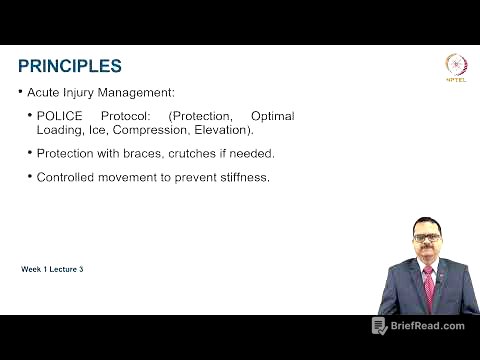TLDR;
This video presents a 7-day keto egg fast protocol designed to help individuals lose up to 10 lbs. It's suited for those aiming to shed the last few pounds, prepare for an event, or restart their diet. The protocol involves five key steps:
- Consuming 14 eggs daily to provide protein and fat while minimising carbs.
- Cooking eggs in grass-fed ghee for its butyrate and CLA content, which supports insulin sensitivity and weight loss.
- Gently cooking eggs (soft scramble, poaching, or soft-boiled) to preserve nutrients and prevent oxidation.
- Choosing pasture-raised or organic eggs for higher omega-3 content and fewer harmful chemicals.
- Pairing the egg diet with an 18/6 intermittent fasting schedule to enhance fat burning and cellular repair.
Introduction to the Keto Egg Fast [0:00]
The video introduces a 7-day protocol designed to help viewers lose up to 10 lbs by following specific keto egg rules. This protocol is particularly effective for individuals trying to lose the last bit of weight, preparing for an upcoming event where they want to look their best, or those who have strayed from their diet and want to quickly get back on track. The protocol aims to kickstart the metabolism and promote fat burning.
Rule 1: Consume 14 Eggs Daily [0:54]
The first rule of the protocol is to eat 14 eggs every day, including the yolks, which are rich in nutrients. This quantity provides approximately 77g of protein and 65g of fat, with minimal carbohydrates (less than 7g). The high protein content helps preserve lean muscle mass and promotes satiety, while the fat also contributes to feeling full. Lowering carbohydrate intake reduces inflammation by lowering insulin levels, which encourages the body to use stored fat for energy. Research supports that consuming whole eggs can improve insulin sensitivity, especially in overweight individuals with metabolic syndrome.
Rule 2: Cook Eggs in Grass-Fed Ghee [2:43]
The second step involves cooking the 14 eggs in grass-fed ghee. Research indicates that grass-fed ghee can be beneficial for managing insulin resistance due to its butyrate content, a short-chain fatty acid. Butyrate improves insulin sensitivity, regulates insulin levels, and reduces inflammation, all of which are crucial for fat loss. Ghee made from grass-fed butter is also rich in conjugated linoleic acid (CLA), which has been linked to improvements in cholesterol, insulin sensitivity, and weight loss.
Rule 3: Cook Eggs Gently [3:55]
The third rule is to cook the eggs as gently as possible, with soft scrambling, poaching, or soft-boiling being the preferred methods. Overcooking eggs can denature the proteins, reducing their digestibility and bioavailability. Light cooking helps retain protein quality and ensures optimal absorption. Overcooking can also oxidise the healthy fats, particularly omega-3 fatty acids, potentially leading to the formation of harmful compounds. Additionally, overcooking may reduce the levels of antioxidants like lutein and zeaxanthin, and can damage the cholesterol, potentially forming harmful oxidation products.
Rule 4: Choose the Right Type of Eggs [5:30]
The fourth step emphasises selecting the right type of eggs, avoiding misleading terms like "cage-free" and "free-range". Instead, it recommends opting for pasture-raised and organic eggs. Pasture-raised eggs come from chickens that have access to outdoor areas, allowing them to roam freely and eat a natural diet, which results in eggs higher in omega-3 fatty acids, vitamin D, and antioxidants. Organic eggs come from chickens fed organic, non-GMO feed and raised without antibiotics and hormones, ensuring the eggs are free from harmful chemicals and pesticides. Vital Farms is mentioned as a brand that offers high-quality organic pasture-raised eggs.
Rule 5: Pair with Intermittent Fasting [7:07]
The fifth step involves pairing the egg diet with intermittent fasting, specifically an 18/6 schedule. This means fasting for 18 hours each day and consuming the 14 eggs within a 6-hour window. Intermittent fasting has been shown to have numerous health benefits, including increased antioxidant defences, cellular repair via autophagy, and ketone production. Autophagy helps clean out damaged cells, while ketones communicate with mitochondria to produce more energy and increase metabolism. Intermittent fasting also helps deplete glycogen stores, encouraging the body to tap into fat reserves for energy.
Addressing Common Questions [11:11]
The video addresses several common questions about the egg fast protocol. Seasoning eggs with salt, pepper, or other spices is acceptable as they are unlikely to significantly impact glucose or insulin levels. Concerns about cholesterol and saturated fat are addressed by explaining that quality eggs cooked properly can actually prevent heart disease, and that cholesterol is essential for brain function, hormone production, and fat burning. The colour of the egg yolk is discussed, with darker orange yolks typically indicating higher levels of vitamins, antioxidants, and omega-3 fatty acids, although synthetic colourants should be considered.
Measuring Progress and Addressing Digestive Issues [14:37]
Besides stepping on the scale, progress can be measured through non-scale victories such as energy levels, skin complexion, sleep quality, and how clothes fit. Loose stools or diarrhoea, which may occur due to the high fat content, can be managed by supporting liver function with supplements and spreading out egg consumption throughout the 6-hour eating window.
Raw Eggs, Nutritional Differences, and Muscle Building [16:31]
The safety of eating raw eggs is discussed, advising caution and emphasising the importance of sourcing eggs from organic, pasture-raised chickens. While raw eggs preserve the most nutrients, the risk of contamination should be considered. The nutritional differences between egg yolks and egg whites are highlighted, noting that while egg whites are higher in protein and lower in calories, the yolks contain most of the essential nutrients. The egg fast diet can support muscle building due to its high protein content, but the primary goal of the 7-day protocol is fat loss.
What to Do After the 7-Day Protocol [19:09]
Following the 7-day protocol, viewers are encouraged to maintain their progress by following fat-burning keto recipes. The video promotes a "Fat Burning Keto Recipe of the Week" program, offering weekly seed oil-free, low-toxin, protein-focused recipes for a monthly subscription fee. The video concludes by recommending another video on carnivore diet weight loss mistakes.









